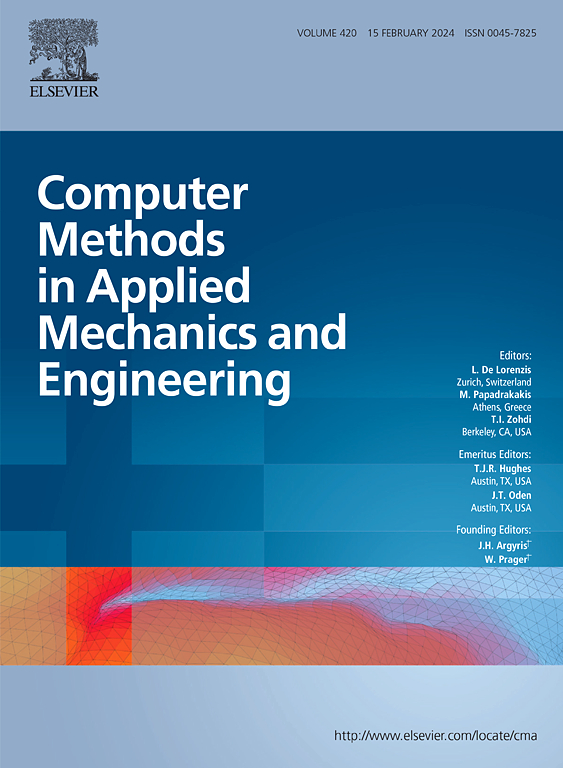基于扩展蔡-希尔准则的正交材料疲劳约束拓扑优化方法
IF 6.9
1区 工程技术
Q1 ENGINEERING, MULTIDISCIPLINARY
Computer Methods in Applied Mechanics and Engineering
Pub Date : 2024-11-16
DOI:10.1016/j.cma.2024.117542
引用次数: 0
摘要
疲劳约束拓扑优化(Fatigue-constrained topology optimization,FCTO)是当前的研究热点,其疲劳约束具有材料属性依赖性、高度非线性和局部性等特点,给FCTO的算法稳定性、计算效率和不同材料的应用带来了挑战。本研究结合材料潜在的各向同性行为,为承受变幅疲劳载荷的结构提供了一种 FCTO 方法。首先,根据正交材料的构成模型和蔡-希尔准则中的多项式形式,提出了一种疲劳破坏函数,用于预测给定加载谱下的多轴疲劳破坏。其次,基于独立连续映射(ICM)方法建立了结构重量最小化的 FCTO 模型,并通过过滤、缩放和聚合疲劳破坏函数进行约束,以提高稳定性和收敛速度。第三,分析了 FCTO 模型中目标和约束的敏感性,并使用卷积滤波器和移动渐近线全局收敛法(GCMMA)求解最优模型,以生成可制造的设计。最后,数值示例证明了该方法对于具有不同材料属性、载荷谱和设计域的二维和三维结构的可行性。所开发的方法旨在促进创建能够承受疲劳载荷的轻质设计,并为材料-结构-性能综合设计的进步提供框架和参考。本文章由计算机程序翻译,如有差异,请以英文原文为准。
Fatigue-constrained topology optimization method for orthotropic materials based on an expanded Tsai-Hill criterion
Fatigue-constrained topology optimization (FCTO) is a currently research hotspot, and its fatigue constraints have material property dependency, highly nonlinear, and local features, which lead to challenges for the algorithm stability, computational efficiency, and different material application of FCTO. This research provides a FCTO method for structures subjected to variable-amplitude fatigue loading, incorporating the potential orthotropic behavior of materials. Firstly, a fatigue failure function derived from the constitutive model of orthotropic materials and the polynomial form in the Tsai-Hill criterion is proposed to predict multiaxial fatigue failure with a given loading spectrum. Secondly, a FCTO model minimizing structural weight is established based on the independent continuous mapping (ICM) method and constrained by a filtered, scaled, and aggregated fatigue failure function to enhance stability and convergence speed. Thirdly, the sensitivities of objective and constraint in the FCTO model are analyzed, and the optimal model is solved using convolutional filters and the globally convergent method of moving asymptotes (GCMMA) to generate manufacturable design. Finally, numerical examples demonstrate the feasibility of the method for 2D and 3D structures with varying material properties, load spectrums, and design domains. The developed method aims to facilitate the creation of lightweight designs capable of withstanding fatigue loads and to provide a framework and references for the advancement of integrated material-structure-performance designs.
求助全文
通过发布文献求助,成功后即可免费获取论文全文。
去求助
来源期刊
CiteScore
12.70
自引率
15.30%
发文量
719
审稿时长
44 days
期刊介绍:
Computer Methods in Applied Mechanics and Engineering stands as a cornerstone in the realm of computational science and engineering. With a history spanning over five decades, the journal has been a key platform for disseminating papers on advanced mathematical modeling and numerical solutions. Interdisciplinary in nature, these contributions encompass mechanics, mathematics, computer science, and various scientific disciplines. The journal welcomes a broad range of computational methods addressing the simulation, analysis, and design of complex physical problems, making it a vital resource for researchers in the field.

 求助内容:
求助内容: 应助结果提醒方式:
应助结果提醒方式:


